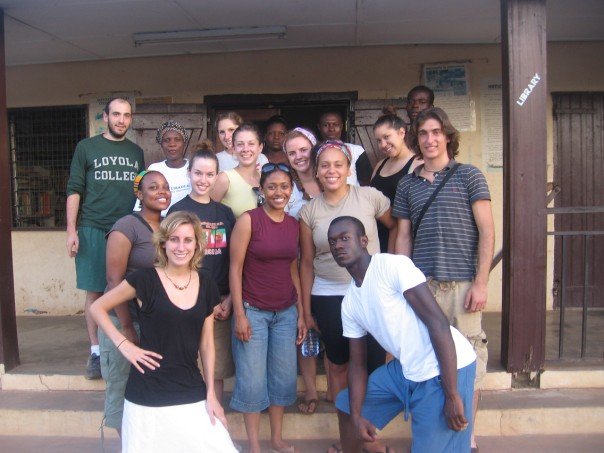The Need for a Washing Machine
May 27, 2011

Published: September 27, 2007
During our time in the tropical village of Wora Wora in Ghana, West Africa, our GO! Ghana group visited and worked at the area hospital frequently. Situated atop a hill at the base of a mountain, the aged congregation of weathered buildings seemed eager to tell their story of injustice.
Upon our arrival, we were given a tour of the facilities by the sole doctor in residence. Despite his obvious fatigue, we were welcomed with the utmost cordiality and kindness. While walking, we turned a corner and passed a chicken walking under a sign that warned of the dangers of avian flu. As we continued our tour of the grounds, one group member, with sweaty eyes squinted, asked which piece of equipment, out of the many the hospital currently lacked, was the most direly needed.
“A washing machine,” the doctor replied.
The disappointment in his voice cut the heat and made a cold shiver down my spine. I realized I’ve never lived any place without clean linens. His response was altogether unexpected; though, in hindsight, perhaps it should have seemed more obvious. I had thought of equipment such as a sonogram or respirator, but never a device that prevents nurses from having to wash bloody, infected sheets with their bare hands.
Though one premise of our trip was to leave modern amenities—such as iPods and cell phones—at home, I had never thought to leave my washing machine behind. My mind struggled to grasp such a piece of injustice. My legs quickly went numb with the heaviness of Western guilt.
I contemplated what providing this facility with a washing machine would entail. I recalled the shower, or rather, “bucket,” I had taken two nights prior. What arduousness; going to a well with a flashlight, filling a bucket tied to a rope with groundwater, trekking it back inside to the bath, finding a place to brace my flashlight, then slowly attempting to get clean. Ultimately, this turned out to be a somewhat fruitless effort as nearly all my scrubbing produced sweat in the heavy, humid, blanket of night air.
I thought of the few times during the trip when we had enjoyed both electricity and running water simultaneously. In our hotel in Accra, I foolishly brushed my teeth with tap water. My insides were so upset that they boycotted holding food for three days.
Night was a hot shade, and as I lay in bed, I deduced that only two utilities would be required to properly sanitize a hospital’s sheets: clean, running water and a reliable flow of electricity. Needless to say, such connections are difficult to come by in the middle of a tropical jungle. I realized how little thought I had given in the past to the logistics of washing my clothing in a machine: the digging that had been done to connect Manhattan with a freshwater source from upstate, the expensive equipment and extensive planning that must have been required to route electrical wiring from a power plant to my apartment, the thousands of workers who are paid to keep such utility systems running smoothly.
It had all been done where I live, but never here. Where was the nearest drilling truck? Who would pay for it to come here? Is there a source of water for it to connect piping to? Even if this and an electrical connection were accomplished, where is the closest place to buy a washing machine, let alone detergent and bleach to sanitize soiled linens in it? The enormity of the task came into view.
Now, months later, I’m back in Sheep’s Meadow wearing clean jeans, sitting on a clean towel and contemplating my experience thus far with the gritty reality of a small part of the world’s overwhelming economic poverty. I often find myself cycling back to the same thought: how challenging it is to clearly identify injustices at first glance and to track their multifarious origins.
After only a month-long stay, my exchange with the people of Wora Wora compelled me to examine where I stood and could not stand as my world quaked with newly attained knowledge of poverty and injustice. It was an earthquake that exposed a world below my feet that had been previously unseen. There’s a world beneath all of our feet and, perhaps with some digging, it may be possible to gain a bit of the knowledge we need to alter our landscape to better fit the needs of our neighbors around us, instead of just ourselves.










